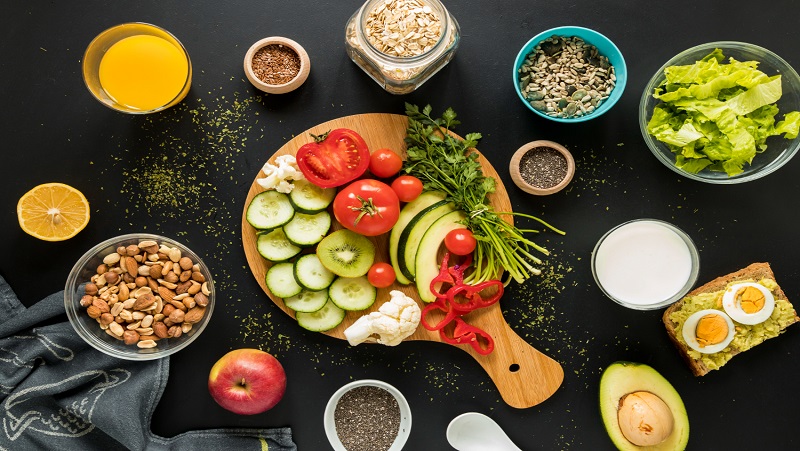The ketogenic diet is considered to be one of the best weight loss diets, and people following it swear by its weight loss effects and overall health benefits. But following this ultra-low-carb, high-fat diet could be challenging, especially if you are new to it. It demands a complete diet makeover – and the first step to it starts at the grocery store.
Grocery shopping on a ketogenic diet leaves most of us wondering as what on earth you can put on your keto food list. After all, finding keto-friendly foods in stores loaded with high-carb, processed junk is not easy! But, we’ve got you covered. Here’s an extensive keto-friendly food list that can make your trips to the aisles a breeze. We are also covering you with tips on what to choose (and avoid) while following a ketogenic diet weight loss plan. So, grab a pen and make your keto food list enjoyable and hassle-free.
But before we delve into the detailed list of keto foods, let’s quickly review the basics of the ketogenic diet.
What is a Ketogenic Diet?
The ketogenic diet is a low-carb, high-fat diet that aims to put your body in the state of ketosis. A metabolic state in which your body burns fat for fuel instead of carbohydrates, promoting increased fat burning and weight loss.
To maintain ketosis, it’s crucial to restrict carbohydrate intake to around 5-10% of total daily calories, focusing instead on consuming moderate protein and ample healthy fats.
With these fundamental principles in mind, let’s delve into the essential items that should be included in your keto-friendly food list.
Must-Have Foods on Your Keto Grocery List
Your low-carb diet should constitute about 40%-50% healthy fats, 40%-50% protein, and 10%-20% good carbs. Here’s what your keto diet food list should look like:
- Vegetables: Stock up on low-carb, non-starchy vegetables like spinach, kale, broccoli, cauliflower, zucchini, green beans, lettuce, and bell peppers. These veggies are low in carbs and high in fiber, making them ideal for a keto diet. Though carrots can be eaten in moderation, underground veggies like beets and potatoes are off-limits and should not be included in your list of foods for keto diet.
- Fruits: Fruits are generally limited on keto due to their higher sugar content; however, small portions of berries like strawberries, blueberries, and raspberries can be enjoyed occasionally. Add them to some freshly whipped cream and make a great low-carb dessert on a keto diet. Cantaloupe, honeydew, peaches, and watermelon can also be enjoyed but in extreme moderation (1/4 C a few times a week).
- Healthy Fats: Fats are essential for maintaining ketosis and providing sustained energy throughout the day. However, you must focus on including healthy fats such as avocados, olive oil, coconut oil, and nuts (almonds, walnuts, pecans)
- Protein: Opt for lean sources of protein like chicken, turkey, fish, and eggs. Incorporate fatty fish like salmon and mackerel for omega-3 fatty acids.
- Dairy Products: Choose full-fat dairy products like cheese, Greek yogurt, and heavy cream. These dairy items are rich in fats and low in carbs, making them suitable for keto.
- Seeds and Nuts: Add seeds like chia seeds, flaxseeds, and pumpkin seeds to your diet for additional fiber and healthy fats. Almond butter and peanut butter (with no added sugars) are also good options. However, pistachios and cashews should be avoided as they are high in carbohydrates.
- Herbs and Spices: Herbs and spices are great flavor enhancers. Extremely low in carbs, they easily make their way into a low-carb, keto diet plan. So, add herbs and spices like basil, oregano, rosemary, garlic, turmeric, and cayenne pepper in your shopping list and create delicious and satisfying meals while staying within your keto dietary guidelines. These ingredients not only add depth and richness to your dishes but also offer various health benefits, such as anti-inflammatory properties and antioxidant support. So, stock up on these herbs and spices to elevate your culinary experience on the keto diet.
- Low-Carb Condiments: Shop for sugar-free or low-carb condiments like mayonnaise, mustard, hot sauce, and salsa to flavor your dishes without adding unnecessary carbs. But avoid adding heavily processed, sugary-laden sauces like ketchup and barbecue sauces to your list of foods for keto diet. Jams, syrups, and sweet spreads are a strict no-no too!
- Keto-friendly Snacks: Look for keto-friendly snacks such as pork rinds, cheese crisps, beef jerky (watch for added sugars), and olives for quick and convenient snacking options.
- Sugar Alternatives: If you have a sweet tooth, buy sugar alternatives like stevia, erythritol, or monk fruit sweetener to satisfy your cravings without spiking blood sugar levels.
- Drinks: Water and unsweetened coffee have to be your main source of hydration during a keto diet. You can also opt for bone broth for added nutrition. But all other fresh, canned, or processed juices and drinks have to be strictly avoided.
Remember to read food labels carefully to avoid hidden sugars and high-carb ingredients. Planning your meals and having a well-stocked keto pantry can make it easier to stick to your ketogenic diet and achieve your health goals.
Power Up Your Ketogenic Diet with Expert Help!
Following a ketogenic diet for weight loss is an effective strategy, but doing it alone can be full of challenges and roadblocks. Even a single mistake can kick your body out of ketosis and derail your entire weight loss efforts. Here are a few problems that you may face while following ketogenic diet for weight loss:
- Carb Creep: It’s easy to underestimate or overlook the carb content in foods, which may lead to unintentional carb intake.
- Lack of Variety: When on keto, you might end up eating the same food over and over again, leading to boredom and potential nutrient deficiencies.
- Social Pressures: Dining out or attending social gatherings can be a challenge when following the ketogenic diet.
- Keto Flu: Some individuals may experience flu-like symptoms, such as fatigue, headaches, and irritability when transitioning into ketosis.
- Misguided Information: There’s a lot of misinformation and conflicting advice around ketogenic diet. Finding reliable sources can be a challenge.
To overcome these challenges and stay on track with your ketogenic diet for weight loss success, it is best to partner with a board-certified keto diet consultant like Dr. Mona Lala. With years of experience in ketogenic nutrition and weight management, she can provide personalized guidance, tailored meal plans (whether you are dining at home or in a restaurant), and ongoing support to ensure your success on the ketogenic diet. She understands the nuances of ketosis and can help you navigate common pitfalls while empowering you with the knowledge and tools needed to achieve sustainable weight loss and improved overall health. Schedule your appointment today and make your weight loss journey smoother, more enjoyable, and ultimately more successful.




